Investigating Entrepreneurial Ventures: Scope, Traits, Mindset
VerifiedAdded on 2023/06/05
|12
|3454
|341
Report
AI Summary
This report investigates the scope of entrepreneurial ventures, examining the traits and characteristics associated with entrepreneurship, and explaining the concept of an entrepreneurial mindset. It highlights the importance of entrepreneurial ventures in driving economic development, emphasizing innovation, risk-taking, and the creation of economic and social value. The report uses examples like Steve Jobs and Bill Gates to illustrate key entrepreneurial traits such as innovation, adaptability, motivation, decisiveness, confidence, and passion. It also discusses the crucial elements of an entrepreneurial mindset, including a positive mental attitude, creativity, and persuasive communication skills, alongside essential skills like leadership and effective communication. The analysis evaluates the similarities and differences between ventures and the traits of entrepreneurs, concluding that these elements are vital for achieving a competitive edge in the marketplace. Desklib offers similar solved assignments and past papers for students.

Unit 9 ESBM
Paraphrase This Document
Need a fresh take? Get an instant paraphrase of this document with our AI Paraphraser

Table of Contents
INTRODUCTION...........................................................................................................................4
TASK...............................................................................................................................................4
P1 Investigate the scope of entrepreneurial ventures, using a variety of examples...............4
P2 Examine the traits and characteristics associated with entrepreneurship..........................5
M1 Evaluate the similarities and differences between entrepreneurial ventures and the traits
and characteristics of entrepreneurs in those ventures...........................................................7
P3 Explain what is meant by an ‘entrepreneurial mind-set’..................................................7
P4 Examine skills and characteristics associated with entrepreneurial mind-set...................8
M2 Determine the ways in which the entrepreneurial mind-set can be encouraged and what it
can bring to a new venture....................................................................................................10
CONCLUSION..............................................................................................................................10
REFERENCES..............................................................................................................................11
INTRODUCTION...........................................................................................................................4
TASK...............................................................................................................................................4
P1 Investigate the scope of entrepreneurial ventures, using a variety of examples...............4
P2 Examine the traits and characteristics associated with entrepreneurship..........................5
M1 Evaluate the similarities and differences between entrepreneurial ventures and the traits
and characteristics of entrepreneurs in those ventures...........................................................7
P3 Explain what is meant by an ‘entrepreneurial mind-set’..................................................7
P4 Examine skills and characteristics associated with entrepreneurial mind-set...................8
M2 Determine the ways in which the entrepreneurial mind-set can be encouraged and what it
can bring to a new venture....................................................................................................10
CONCLUSION..............................................................................................................................10
REFERENCES..............................................................................................................................11
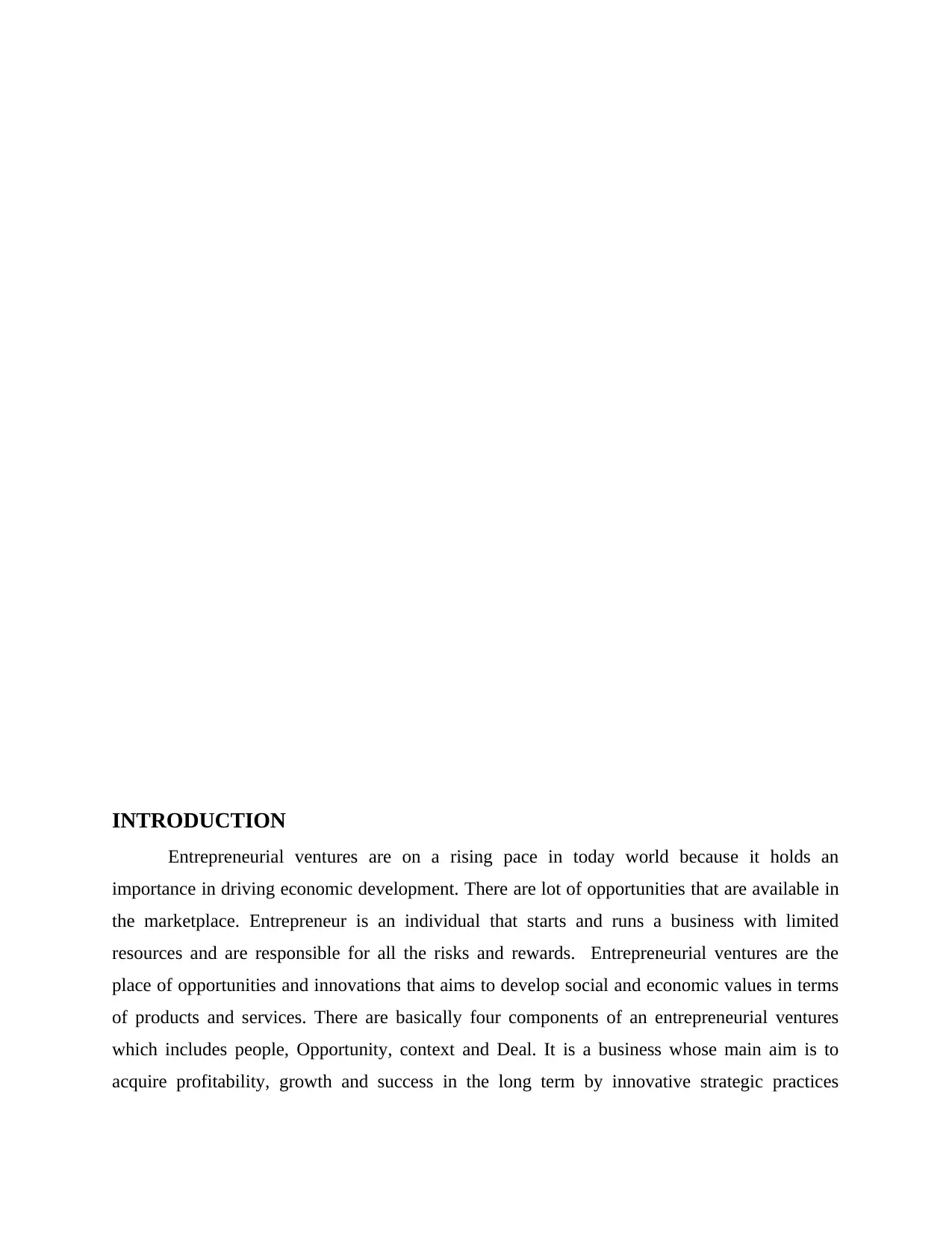
INTRODUCTION
Entrepreneurial ventures are on a rising pace in today world because it holds an
importance in driving economic development. There are lot of opportunities that are available in
the marketplace. Entrepreneur is an individual that starts and runs a business with limited
resources and are responsible for all the risks and rewards. Entrepreneurial ventures are the
place of opportunities and innovations that aims to develop social and economic values in terms
of products and services. There are basically four components of an entrepreneurial ventures
which includes people, Opportunity, context and Deal. It is a business whose main aim is to
acquire profitability, growth and success in the long term by innovative strategic practices
Entrepreneurial ventures are on a rising pace in today world because it holds an
importance in driving economic development. There are lot of opportunities that are available in
the marketplace. Entrepreneur is an individual that starts and runs a business with limited
resources and are responsible for all the risks and rewards. Entrepreneurial ventures are the
place of opportunities and innovations that aims to develop social and economic values in terms
of products and services. There are basically four components of an entrepreneurial ventures
which includes people, Opportunity, context and Deal. It is a business whose main aim is to
acquire profitability, growth and success in the long term by innovative strategic practices
⊘ This is a preview!⊘
Do you want full access?
Subscribe today to unlock all pages.

Trusted by 1+ million students worldwide
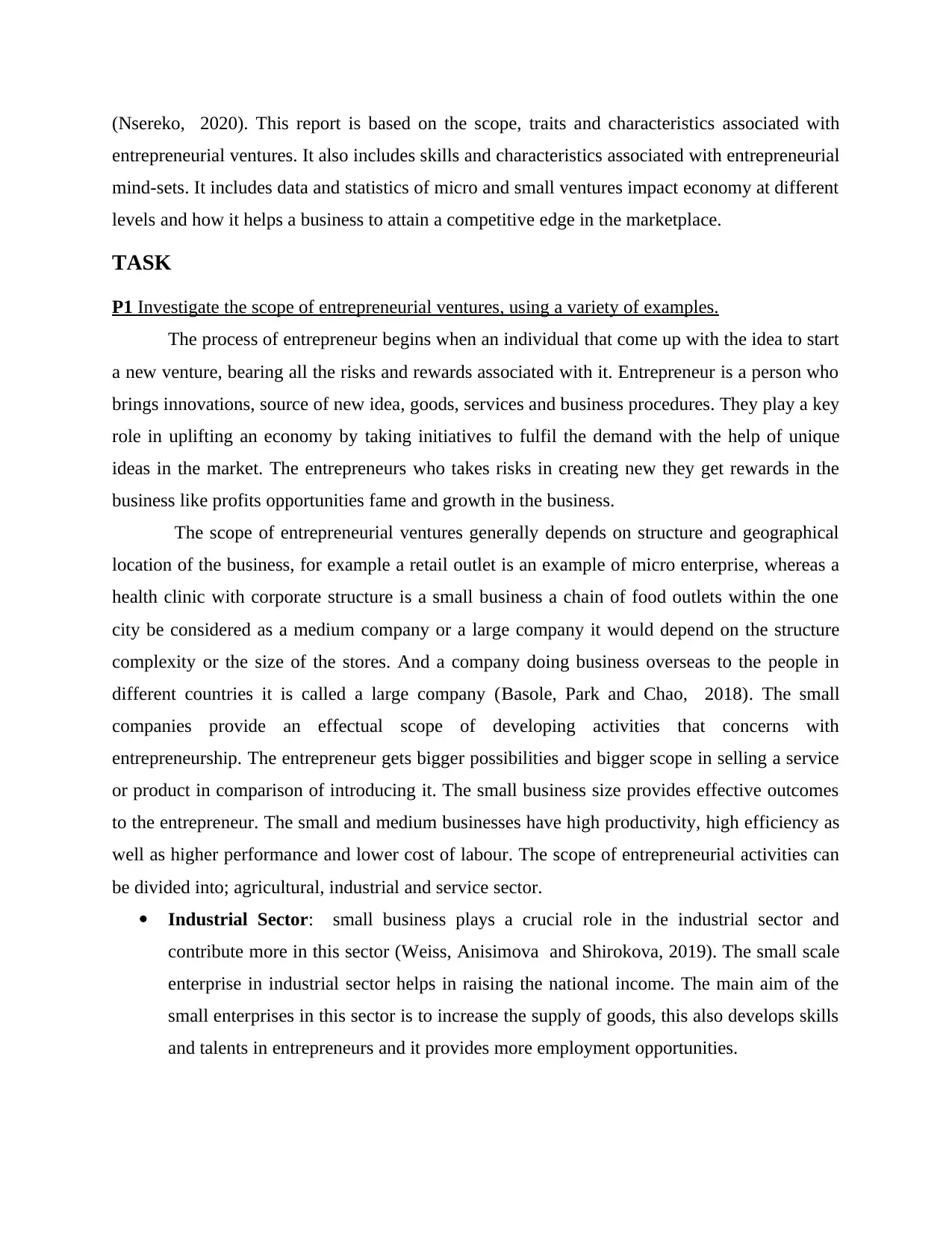
(Nsereko, 2020). This report is based on the scope, traits and characteristics associated with
entrepreneurial ventures. It also includes skills and characteristics associated with entrepreneurial
mind-sets. It includes data and statistics of micro and small ventures impact economy at different
levels and how it helps a business to attain a competitive edge in the marketplace.
TASK
P1 Investigate the scope of entrepreneurial ventures, using a variety of examples.
The process of entrepreneur begins when an individual that come up with the idea to start
a new venture, bearing all the risks and rewards associated with it. Entrepreneur is a person who
brings innovations, source of new idea, goods, services and business procedures. They play a key
role in uplifting an economy by taking initiatives to fulfil the demand with the help of unique
ideas in the market. The entrepreneurs who takes risks in creating new they get rewards in the
business like profits opportunities fame and growth in the business.
The scope of entrepreneurial ventures generally depends on structure and geographical
location of the business, for example a retail outlet is an example of micro enterprise, whereas a
health clinic with corporate structure is a small business a chain of food outlets within the one
city be considered as a medium company or a large company it would depend on the structure
complexity or the size of the stores. And a company doing business overseas to the people in
different countries it is called a large company (Basole, Park and Chao, 2018). The small
companies provide an effectual scope of developing activities that concerns with
entrepreneurship. The entrepreneur gets bigger possibilities and bigger scope in selling a service
or product in comparison of introducing it. The small business size provides effective outcomes
to the entrepreneur. The small and medium businesses have high productivity, high efficiency as
well as higher performance and lower cost of labour. The scope of entrepreneurial activities can
be divided into; agricultural, industrial and service sector.
Industrial Sector: small business plays a crucial role in the industrial sector and
contribute more in this sector (Weiss, Anisimova and Shirokova, 2019). The small scale
enterprise in industrial sector helps in raising the national income. The main aim of the
small enterprises in this sector is to increase the supply of goods, this also develops skills
and talents in entrepreneurs and it provides more employment opportunities.
entrepreneurial ventures. It also includes skills and characteristics associated with entrepreneurial
mind-sets. It includes data and statistics of micro and small ventures impact economy at different
levels and how it helps a business to attain a competitive edge in the marketplace.
TASK
P1 Investigate the scope of entrepreneurial ventures, using a variety of examples.
The process of entrepreneur begins when an individual that come up with the idea to start
a new venture, bearing all the risks and rewards associated with it. Entrepreneur is a person who
brings innovations, source of new idea, goods, services and business procedures. They play a key
role in uplifting an economy by taking initiatives to fulfil the demand with the help of unique
ideas in the market. The entrepreneurs who takes risks in creating new they get rewards in the
business like profits opportunities fame and growth in the business.
The scope of entrepreneurial ventures generally depends on structure and geographical
location of the business, for example a retail outlet is an example of micro enterprise, whereas a
health clinic with corporate structure is a small business a chain of food outlets within the one
city be considered as a medium company or a large company it would depend on the structure
complexity or the size of the stores. And a company doing business overseas to the people in
different countries it is called a large company (Basole, Park and Chao, 2018). The small
companies provide an effectual scope of developing activities that concerns with
entrepreneurship. The entrepreneur gets bigger possibilities and bigger scope in selling a service
or product in comparison of introducing it. The small business size provides effective outcomes
to the entrepreneur. The small and medium businesses have high productivity, high efficiency as
well as higher performance and lower cost of labour. The scope of entrepreneurial activities can
be divided into; agricultural, industrial and service sector.
Industrial Sector: small business plays a crucial role in the industrial sector and
contribute more in this sector (Weiss, Anisimova and Shirokova, 2019). The small scale
enterprise in industrial sector helps in raising the national income. The main aim of the
small enterprises in this sector is to increase the supply of goods, this also develops skills
and talents in entrepreneurs and it provides more employment opportunities.
Paraphrase This Document
Need a fresh take? Get an instant paraphrase of this document with our AI Paraphraser
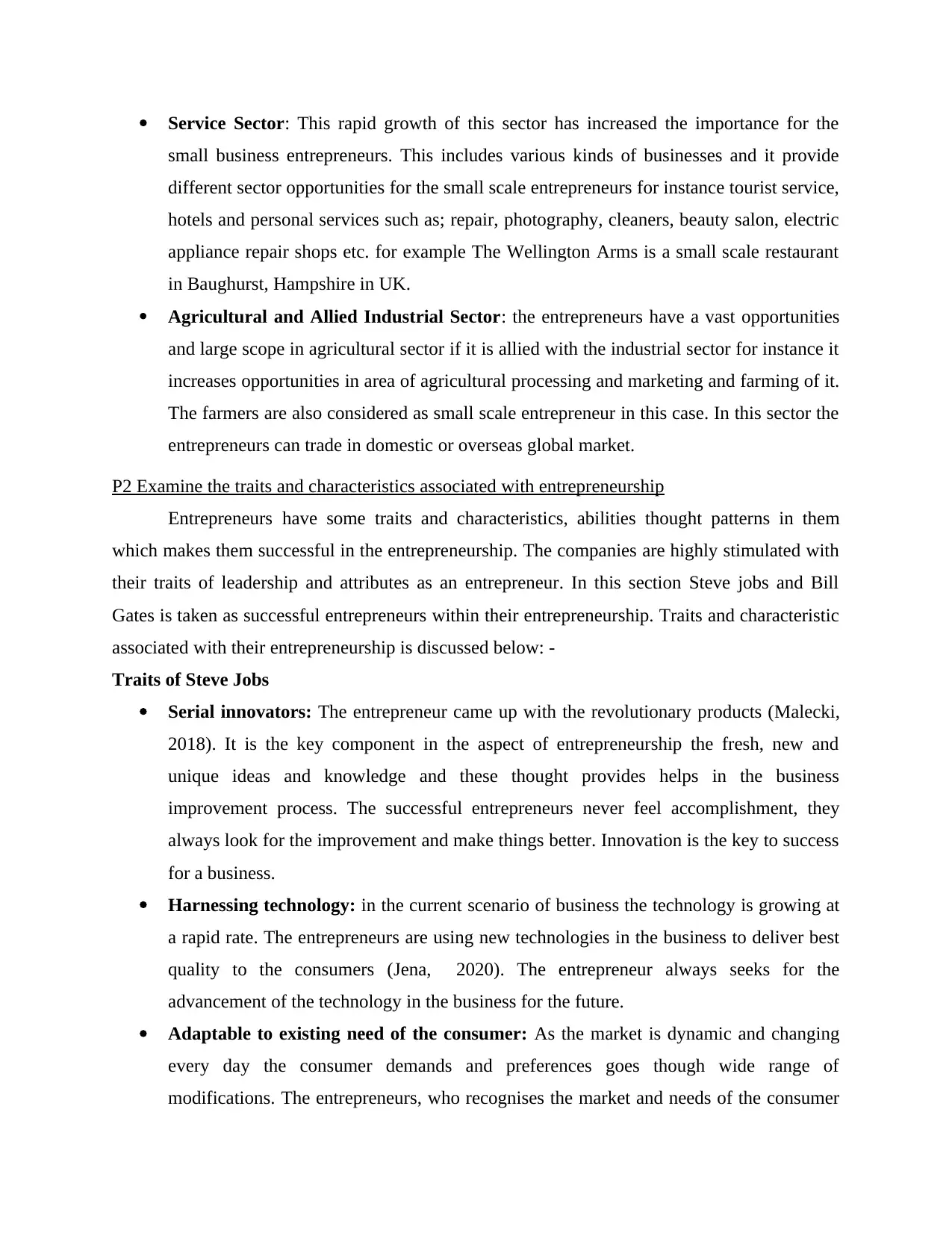
Service Sector: This rapid growth of this sector has increased the importance for the
small business entrepreneurs. This includes various kinds of businesses and it provide
different sector opportunities for the small scale entrepreneurs for instance tourist service,
hotels and personal services such as; repair, photography, cleaners, beauty salon, electric
appliance repair shops etc. for example The Wellington Arms is a small scale restaurant
in Baughurst, Hampshire in UK.
Agricultural and Allied Industrial Sector: the entrepreneurs have a vast opportunities
and large scope in agricultural sector if it is allied with the industrial sector for instance it
increases opportunities in area of agricultural processing and marketing and farming of it.
The farmers are also considered as small scale entrepreneur in this case. In this sector the
entrepreneurs can trade in domestic or overseas global market.
P2 Examine the traits and characteristics associated with entrepreneurship
Entrepreneurs have some traits and characteristics, abilities thought patterns in them
which makes them successful in the entrepreneurship. The companies are highly stimulated with
their traits of leadership and attributes as an entrepreneur. In this section Steve jobs and Bill
Gates is taken as successful entrepreneurs within their entrepreneurship. Traits and characteristic
associated with their entrepreneurship is discussed below: -
Traits of Steve Jobs
Serial innovators: The entrepreneur came up with the revolutionary products (Malecki,
2018). It is the key component in the aspect of entrepreneurship the fresh, new and
unique ideas and knowledge and these thought provides helps in the business
improvement process. The successful entrepreneurs never feel accomplishment, they
always look for the improvement and make things better. Innovation is the key to success
for a business.
Harnessing technology: in the current scenario of business the technology is growing at
a rapid rate. The entrepreneurs are using new technologies in the business to deliver best
quality to the consumers (Jena, 2020). The entrepreneur always seeks for the
advancement of the technology in the business for the future.
Adaptable to existing need of the consumer: As the market is dynamic and changing
every day the consumer demands and preferences goes though wide range of
modifications. The entrepreneurs, who recognises the market and needs of the consumer
small business entrepreneurs. This includes various kinds of businesses and it provide
different sector opportunities for the small scale entrepreneurs for instance tourist service,
hotels and personal services such as; repair, photography, cleaners, beauty salon, electric
appliance repair shops etc. for example The Wellington Arms is a small scale restaurant
in Baughurst, Hampshire in UK.
Agricultural and Allied Industrial Sector: the entrepreneurs have a vast opportunities
and large scope in agricultural sector if it is allied with the industrial sector for instance it
increases opportunities in area of agricultural processing and marketing and farming of it.
The farmers are also considered as small scale entrepreneur in this case. In this sector the
entrepreneurs can trade in domestic or overseas global market.
P2 Examine the traits and characteristics associated with entrepreneurship
Entrepreneurs have some traits and characteristics, abilities thought patterns in them
which makes them successful in the entrepreneurship. The companies are highly stimulated with
their traits of leadership and attributes as an entrepreneur. In this section Steve jobs and Bill
Gates is taken as successful entrepreneurs within their entrepreneurship. Traits and characteristic
associated with their entrepreneurship is discussed below: -
Traits of Steve Jobs
Serial innovators: The entrepreneur came up with the revolutionary products (Malecki,
2018). It is the key component in the aspect of entrepreneurship the fresh, new and
unique ideas and knowledge and these thought provides helps in the business
improvement process. The successful entrepreneurs never feel accomplishment, they
always look for the improvement and make things better. Innovation is the key to success
for a business.
Harnessing technology: in the current scenario of business the technology is growing at
a rapid rate. The entrepreneurs are using new technologies in the business to deliver best
quality to the consumers (Jena, 2020). The entrepreneur always seeks for the
advancement of the technology in the business for the future.
Adaptable to existing need of the consumer: As the market is dynamic and changing
every day the consumer demands and preferences goes though wide range of
modifications. The entrepreneurs, who recognises the market and needs of the consumer
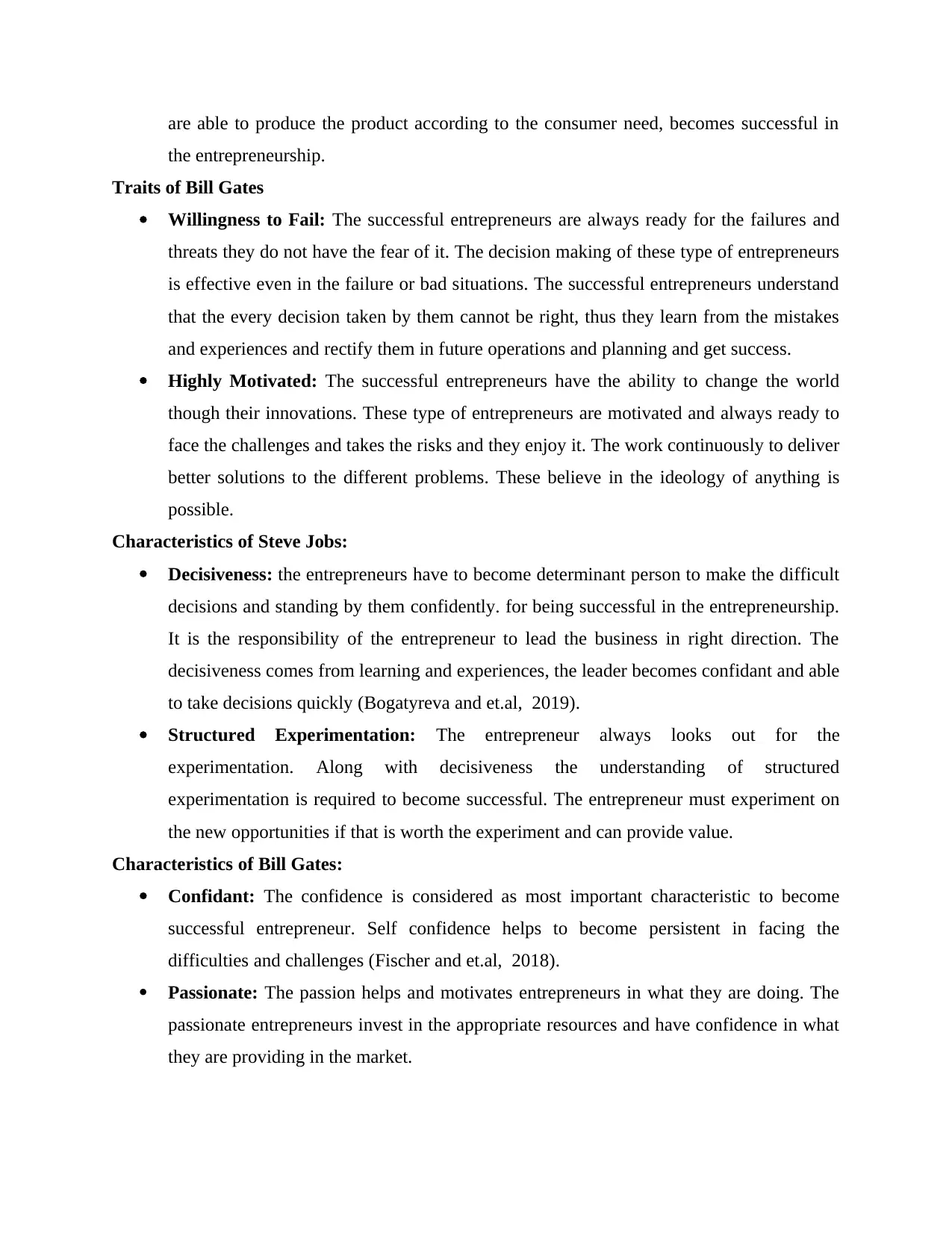
are able to produce the product according to the consumer need, becomes successful in
the entrepreneurship.
Traits of Bill Gates
Willingness to Fail: The successful entrepreneurs are always ready for the failures and
threats they do not have the fear of it. The decision making of these type of entrepreneurs
is effective even in the failure or bad situations. The successful entrepreneurs understand
that the every decision taken by them cannot be right, thus they learn from the mistakes
and experiences and rectify them in future operations and planning and get success.
Highly Motivated: The successful entrepreneurs have the ability to change the world
though their innovations. These type of entrepreneurs are motivated and always ready to
face the challenges and takes the risks and they enjoy it. The work continuously to deliver
better solutions to the different problems. These believe in the ideology of anything is
possible.
Characteristics of Steve Jobs:
Decisiveness: the entrepreneurs have to become determinant person to make the difficult
decisions and standing by them confidently. for being successful in the entrepreneurship.
It is the responsibility of the entrepreneur to lead the business in right direction. The
decisiveness comes from learning and experiences, the leader becomes confidant and able
to take decisions quickly (Bogatyreva and et.al, 2019).
Structured Experimentation: The entrepreneur always looks out for the
experimentation. Along with decisiveness the understanding of structured
experimentation is required to become successful. The entrepreneur must experiment on
the new opportunities if that is worth the experiment and can provide value.
Characteristics of Bill Gates:
Confidant: The confidence is considered as most important characteristic to become
successful entrepreneur. Self confidence helps to become persistent in facing the
difficulties and challenges (Fischer and et.al, 2018).
Passionate: The passion helps and motivates entrepreneurs in what they are doing. The
passionate entrepreneurs invest in the appropriate resources and have confidence in what
they are providing in the market.
the entrepreneurship.
Traits of Bill Gates
Willingness to Fail: The successful entrepreneurs are always ready for the failures and
threats they do not have the fear of it. The decision making of these type of entrepreneurs
is effective even in the failure or bad situations. The successful entrepreneurs understand
that the every decision taken by them cannot be right, thus they learn from the mistakes
and experiences and rectify them in future operations and planning and get success.
Highly Motivated: The successful entrepreneurs have the ability to change the world
though their innovations. These type of entrepreneurs are motivated and always ready to
face the challenges and takes the risks and they enjoy it. The work continuously to deliver
better solutions to the different problems. These believe in the ideology of anything is
possible.
Characteristics of Steve Jobs:
Decisiveness: the entrepreneurs have to become determinant person to make the difficult
decisions and standing by them confidently. for being successful in the entrepreneurship.
It is the responsibility of the entrepreneur to lead the business in right direction. The
decisiveness comes from learning and experiences, the leader becomes confidant and able
to take decisions quickly (Bogatyreva and et.al, 2019).
Structured Experimentation: The entrepreneur always looks out for the
experimentation. Along with decisiveness the understanding of structured
experimentation is required to become successful. The entrepreneur must experiment on
the new opportunities if that is worth the experiment and can provide value.
Characteristics of Bill Gates:
Confidant: The confidence is considered as most important characteristic to become
successful entrepreneur. Self confidence helps to become persistent in facing the
difficulties and challenges (Fischer and et.al, 2018).
Passionate: The passion helps and motivates entrepreneurs in what they are doing. The
passionate entrepreneurs invest in the appropriate resources and have confidence in what
they are providing in the market.
⊘ This is a preview!⊘
Do you want full access?
Subscribe today to unlock all pages.

Trusted by 1+ million students worldwide
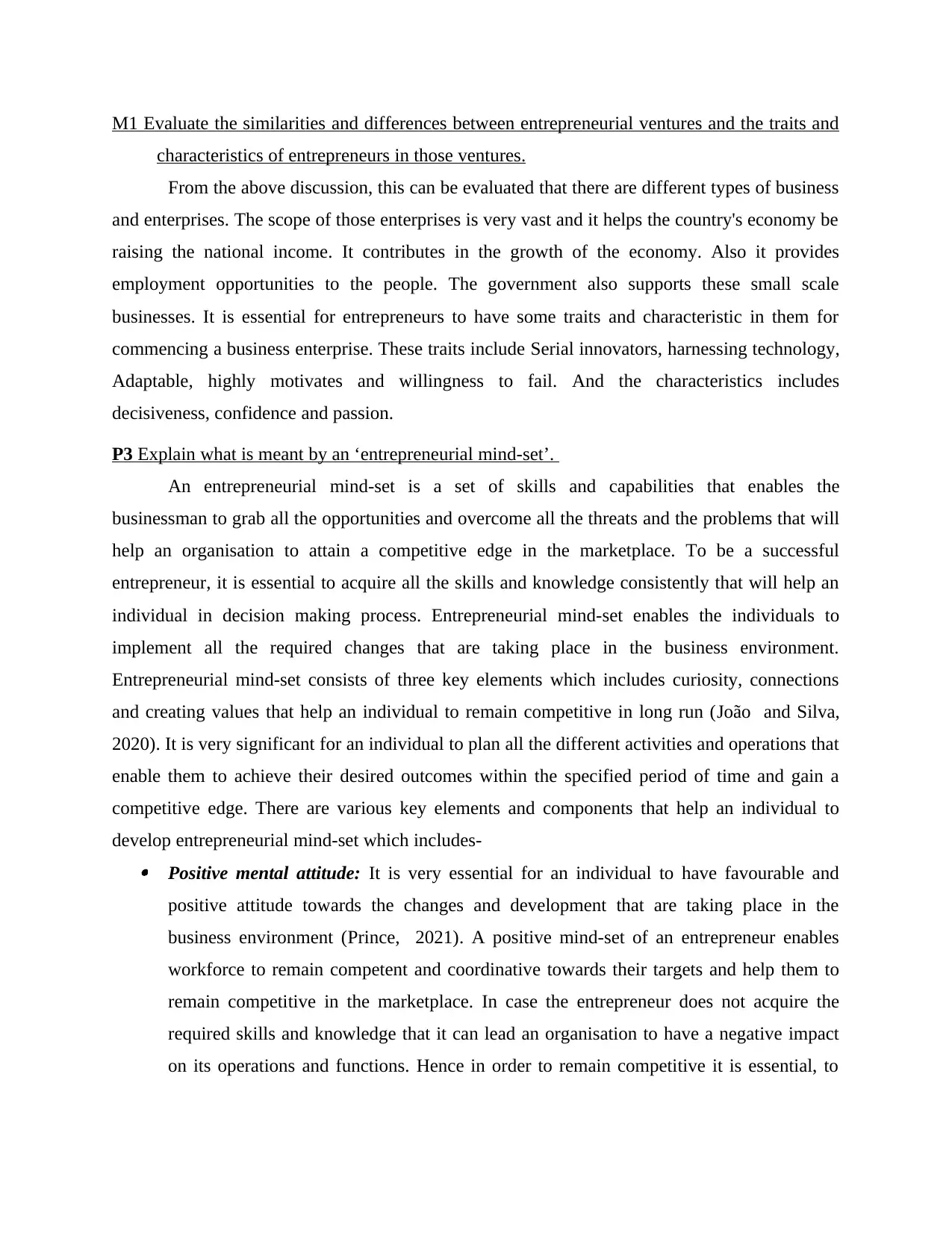
M1 Evaluate the similarities and differences between entrepreneurial ventures and the traits and
characteristics of entrepreneurs in those ventures.
From the above discussion, this can be evaluated that there are different types of business
and enterprises. The scope of those enterprises is very vast and it helps the country's economy be
raising the national income. It contributes in the growth of the economy. Also it provides
employment opportunities to the people. The government also supports these small scale
businesses. It is essential for entrepreneurs to have some traits and characteristic in them for
commencing a business enterprise. These traits include Serial innovators, harnessing technology,
Adaptable, highly motivates and willingness to fail. And the characteristics includes
decisiveness, confidence and passion.
P3 Explain what is meant by an ‘entrepreneurial mind-set’.
An entrepreneurial mind-set is a set of skills and capabilities that enables the
businessman to grab all the opportunities and overcome all the threats and the problems that will
help an organisation to attain a competitive edge in the marketplace. To be a successful
entrepreneur, it is essential to acquire all the skills and knowledge consistently that will help an
individual in decision making process. Entrepreneurial mind-set enables the individuals to
implement all the required changes that are taking place in the business environment.
Entrepreneurial mind-set consists of three key elements which includes curiosity, connections
and creating values that help an individual to remain competitive in long run (João and Silva,
2020). It is very significant for an individual to plan all the different activities and operations that
enable them to achieve their desired outcomes within the specified period of time and gain a
competitive edge. There are various key elements and components that help an individual to
develop entrepreneurial mind-set which includes- Positive mental attitude: It is very essential for an individual to have favourable and
positive attitude towards the changes and development that are taking place in the
business environment (Prince, 2021). A positive mind-set of an entrepreneur enables
workforce to remain competent and coordinative towards their targets and help them to
remain competitive in the marketplace. In case the entrepreneur does not acquire the
required skills and knowledge that it can lead an organisation to have a negative impact
on its operations and functions. Hence in order to remain competitive it is essential, to
characteristics of entrepreneurs in those ventures.
From the above discussion, this can be evaluated that there are different types of business
and enterprises. The scope of those enterprises is very vast and it helps the country's economy be
raising the national income. It contributes in the growth of the economy. Also it provides
employment opportunities to the people. The government also supports these small scale
businesses. It is essential for entrepreneurs to have some traits and characteristic in them for
commencing a business enterprise. These traits include Serial innovators, harnessing technology,
Adaptable, highly motivates and willingness to fail. And the characteristics includes
decisiveness, confidence and passion.
P3 Explain what is meant by an ‘entrepreneurial mind-set’.
An entrepreneurial mind-set is a set of skills and capabilities that enables the
businessman to grab all the opportunities and overcome all the threats and the problems that will
help an organisation to attain a competitive edge in the marketplace. To be a successful
entrepreneur, it is essential to acquire all the skills and knowledge consistently that will help an
individual in decision making process. Entrepreneurial mind-set enables the individuals to
implement all the required changes that are taking place in the business environment.
Entrepreneurial mind-set consists of three key elements which includes curiosity, connections
and creating values that help an individual to remain competitive in long run (João and Silva,
2020). It is very significant for an individual to plan all the different activities and operations that
enable them to achieve their desired outcomes within the specified period of time and gain a
competitive edge. There are various key elements and components that help an individual to
develop entrepreneurial mind-set which includes- Positive mental attitude: It is very essential for an individual to have favourable and
positive attitude towards the changes and development that are taking place in the
business environment (Prince, 2021). A positive mind-set of an entrepreneur enables
workforce to remain competent and coordinative towards their targets and help them to
remain competitive in the marketplace. In case the entrepreneur does not acquire the
required skills and knowledge that it can lead an organisation to have a negative impact
on its operations and functions. Hence in order to remain competitive it is essential, to
Paraphrase This Document
Need a fresh take? Get an instant paraphrase of this document with our AI Paraphraser
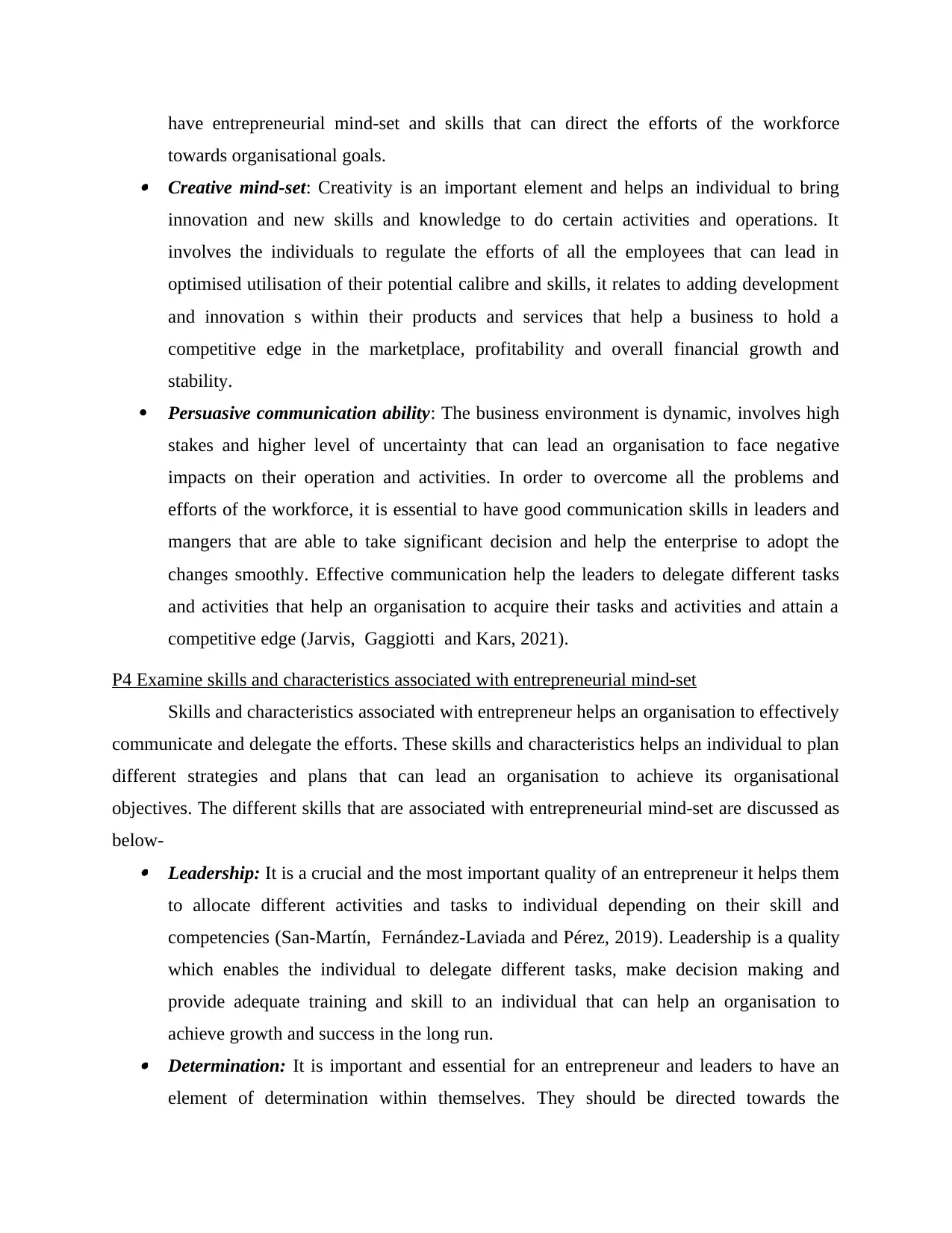
have entrepreneurial mind-set and skills that can direct the efforts of the workforce
towards organisational goals. Creative mind-set: Creativity is an important element and helps an individual to bring
innovation and new skills and knowledge to do certain activities and operations. It
involves the individuals to regulate the efforts of all the employees that can lead in
optimised utilisation of their potential calibre and skills, it relates to adding development
and innovation s within their products and services that help a business to hold a
competitive edge in the marketplace, profitability and overall financial growth and
stability.
Persuasive communication ability: The business environment is dynamic, involves high
stakes and higher level of uncertainty that can lead an organisation to face negative
impacts on their operation and activities. In order to overcome all the problems and
efforts of the workforce, it is essential to have good communication skills in leaders and
mangers that are able to take significant decision and help the enterprise to adopt the
changes smoothly. Effective communication help the leaders to delegate different tasks
and activities that help an organisation to acquire their tasks and activities and attain a
competitive edge (Jarvis, Gaggiotti and Kars, 2021).
P4 Examine skills and characteristics associated with entrepreneurial mind-set
Skills and characteristics associated with entrepreneur helps an organisation to effectively
communicate and delegate the efforts. These skills and characteristics helps an individual to plan
different strategies and plans that can lead an organisation to achieve its organisational
objectives. The different skills that are associated with entrepreneurial mind-set are discussed as
below- Leadership: It is a crucial and the most important quality of an entrepreneur it helps them
to allocate different activities and tasks to individual depending on their skill and
competencies (San-Martín, Fernández-Laviada and Pérez, 2019). Leadership is a quality
which enables the individual to delegate different tasks, make decision making and
provide adequate training and skill to an individual that can help an organisation to
achieve growth and success in the long run. Determination: It is important and essential for an entrepreneur and leaders to have an
element of determination within themselves. They should be directed towards the
towards organisational goals. Creative mind-set: Creativity is an important element and helps an individual to bring
innovation and new skills and knowledge to do certain activities and operations. It
involves the individuals to regulate the efforts of all the employees that can lead in
optimised utilisation of their potential calibre and skills, it relates to adding development
and innovation s within their products and services that help a business to hold a
competitive edge in the marketplace, profitability and overall financial growth and
stability.
Persuasive communication ability: The business environment is dynamic, involves high
stakes and higher level of uncertainty that can lead an organisation to face negative
impacts on their operation and activities. In order to overcome all the problems and
efforts of the workforce, it is essential to have good communication skills in leaders and
mangers that are able to take significant decision and help the enterprise to adopt the
changes smoothly. Effective communication help the leaders to delegate different tasks
and activities that help an organisation to acquire their tasks and activities and attain a
competitive edge (Jarvis, Gaggiotti and Kars, 2021).
P4 Examine skills and characteristics associated with entrepreneurial mind-set
Skills and characteristics associated with entrepreneur helps an organisation to effectively
communicate and delegate the efforts. These skills and characteristics helps an individual to plan
different strategies and plans that can lead an organisation to achieve its organisational
objectives. The different skills that are associated with entrepreneurial mind-set are discussed as
below- Leadership: It is a crucial and the most important quality of an entrepreneur it helps them
to allocate different activities and tasks to individual depending on their skill and
competencies (San-Martín, Fernández-Laviada and Pérez, 2019). Leadership is a quality
which enables the individual to delegate different tasks, make decision making and
provide adequate training and skill to an individual that can help an organisation to
achieve growth and success in the long run. Determination: It is important and essential for an entrepreneur and leaders to have an
element of determination within themselves. They should be directed towards the
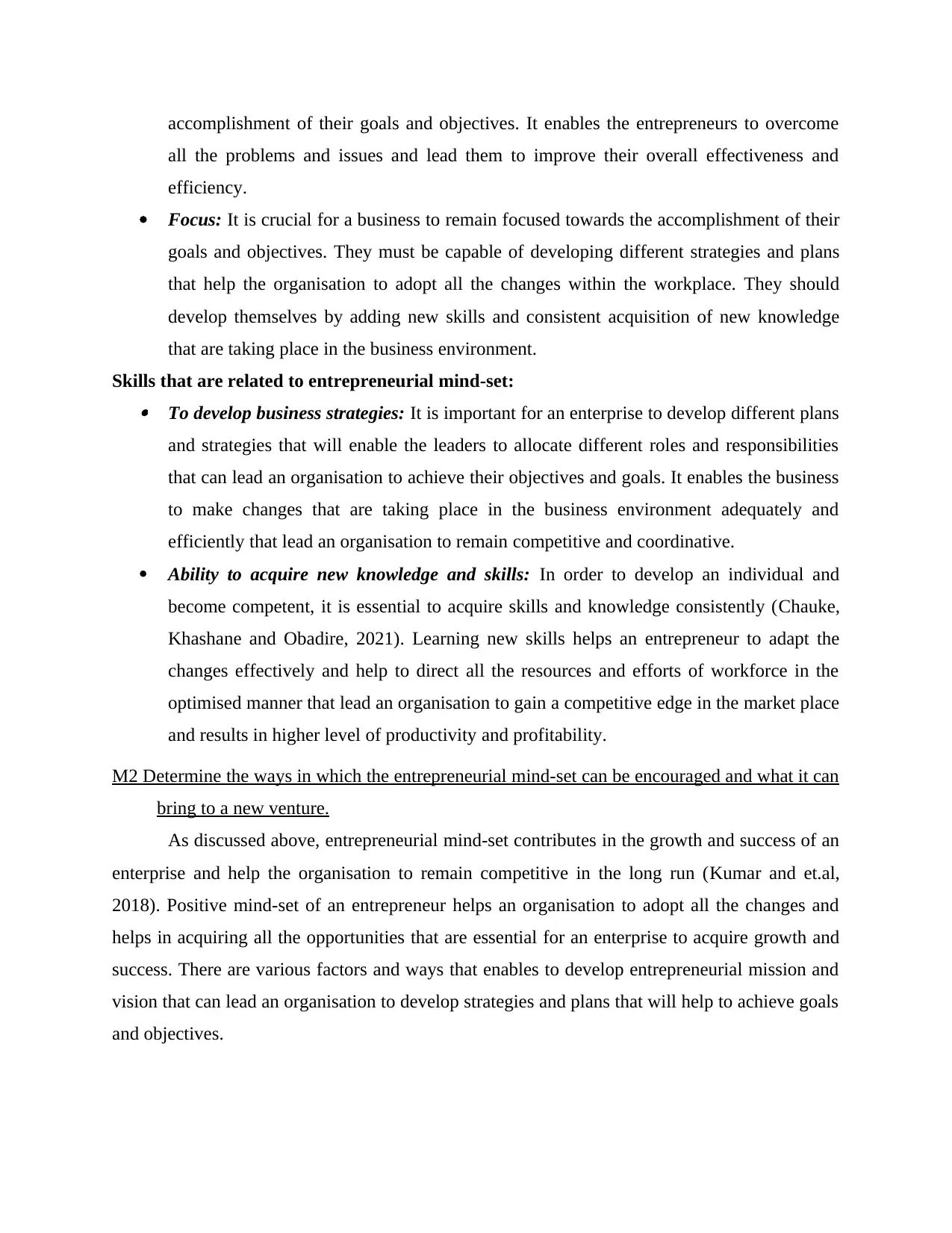
accomplishment of their goals and objectives. It enables the entrepreneurs to overcome
all the problems and issues and lead them to improve their overall effectiveness and
efficiency.
Focus: It is crucial for a business to remain focused towards the accomplishment of their
goals and objectives. They must be capable of developing different strategies and plans
that help the organisation to adopt all the changes within the workplace. They should
develop themselves by adding new skills and consistent acquisition of new knowledge
that are taking place in the business environment.
Skills that are related to entrepreneurial mind-set: To develop business strategies: It is important for an enterprise to develop different plans
and strategies that will enable the leaders to allocate different roles and responsibilities
that can lead an organisation to achieve their objectives and goals. It enables the business
to make changes that are taking place in the business environment adequately and
efficiently that lead an organisation to remain competitive and coordinative.
Ability to acquire new knowledge and skills: In order to develop an individual and
become competent, it is essential to acquire skills and knowledge consistently (Chauke,
Khashane and Obadire, 2021). Learning new skills helps an entrepreneur to adapt the
changes effectively and help to direct all the resources and efforts of workforce in the
optimised manner that lead an organisation to gain a competitive edge in the market place
and results in higher level of productivity and profitability.
M2 Determine the ways in which the entrepreneurial mind-set can be encouraged and what it can
bring to a new venture.
As discussed above, entrepreneurial mind-set contributes in the growth and success of an
enterprise and help the organisation to remain competitive in the long run (Kumar and et.al,
2018). Positive mind-set of an entrepreneur helps an organisation to adopt all the changes and
helps in acquiring all the opportunities that are essential for an enterprise to acquire growth and
success. There are various factors and ways that enables to develop entrepreneurial mission and
vision that can lead an organisation to develop strategies and plans that will help to achieve goals
and objectives.
all the problems and issues and lead them to improve their overall effectiveness and
efficiency.
Focus: It is crucial for a business to remain focused towards the accomplishment of their
goals and objectives. They must be capable of developing different strategies and plans
that help the organisation to adopt all the changes within the workplace. They should
develop themselves by adding new skills and consistent acquisition of new knowledge
that are taking place in the business environment.
Skills that are related to entrepreneurial mind-set: To develop business strategies: It is important for an enterprise to develop different plans
and strategies that will enable the leaders to allocate different roles and responsibilities
that can lead an organisation to achieve their objectives and goals. It enables the business
to make changes that are taking place in the business environment adequately and
efficiently that lead an organisation to remain competitive and coordinative.
Ability to acquire new knowledge and skills: In order to develop an individual and
become competent, it is essential to acquire skills and knowledge consistently (Chauke,
Khashane and Obadire, 2021). Learning new skills helps an entrepreneur to adapt the
changes effectively and help to direct all the resources and efforts of workforce in the
optimised manner that lead an organisation to gain a competitive edge in the market place
and results in higher level of productivity and profitability.
M2 Determine the ways in which the entrepreneurial mind-set can be encouraged and what it can
bring to a new venture.
As discussed above, entrepreneurial mind-set contributes in the growth and success of an
enterprise and help the organisation to remain competitive in the long run (Kumar and et.al,
2018). Positive mind-set of an entrepreneur helps an organisation to adopt all the changes and
helps in acquiring all the opportunities that are essential for an enterprise to acquire growth and
success. There are various factors and ways that enables to develop entrepreneurial mission and
vision that can lead an organisation to develop strategies and plans that will help to achieve goals
and objectives.
⊘ This is a preview!⊘
Do you want full access?
Subscribe today to unlock all pages.

Trusted by 1+ million students worldwide
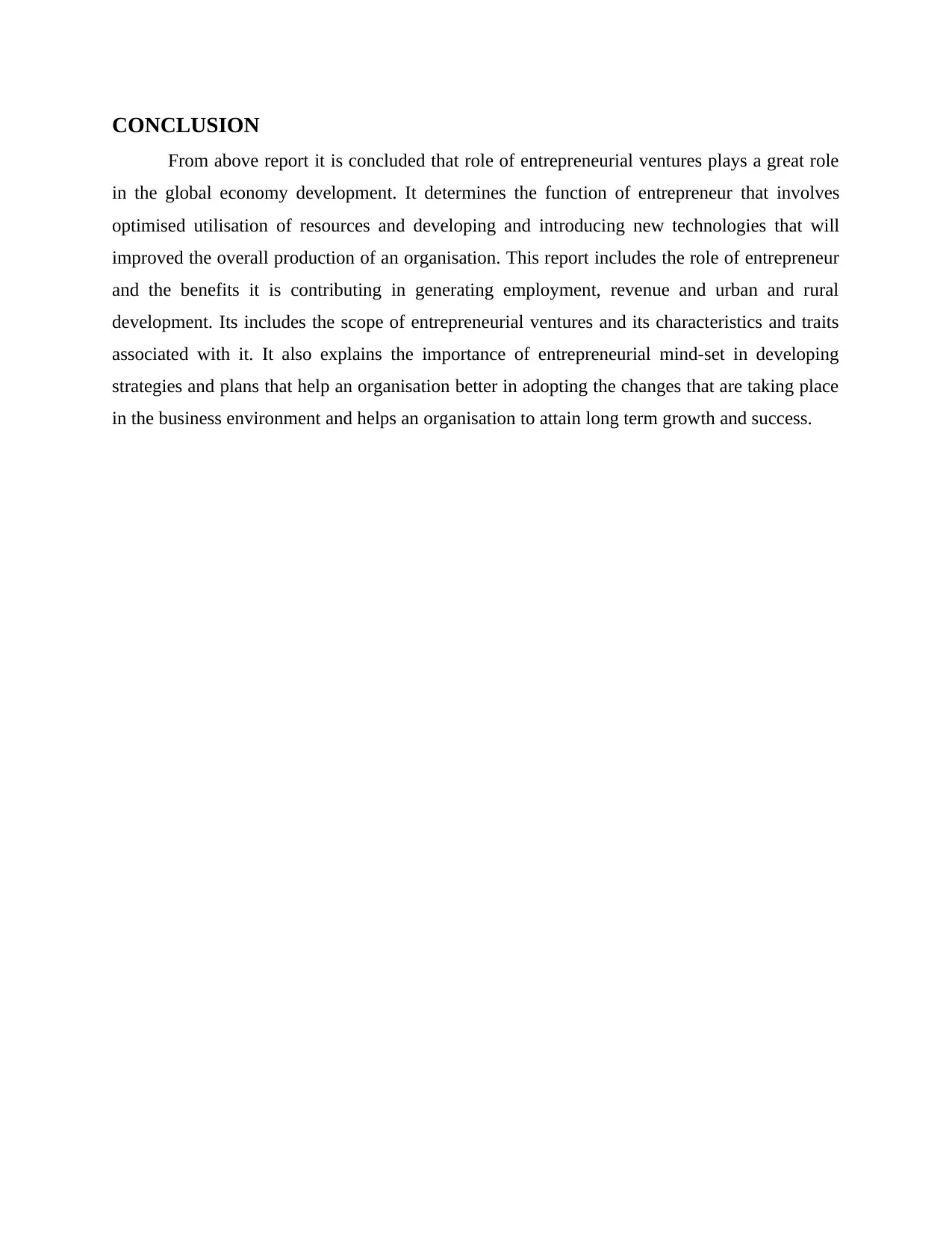
CONCLUSION
From above report it is concluded that role of entrepreneurial ventures plays a great role
in the global economy development. It determines the function of entrepreneur that involves
optimised utilisation of resources and developing and introducing new technologies that will
improved the overall production of an organisation. This report includes the role of entrepreneur
and the benefits it is contributing in generating employment, revenue and urban and rural
development. Its includes the scope of entrepreneurial ventures and its characteristics and traits
associated with it. It also explains the importance of entrepreneurial mind-set in developing
strategies and plans that help an organisation better in adopting the changes that are taking place
in the business environment and helps an organisation to attain long term growth and success.
From above report it is concluded that role of entrepreneurial ventures plays a great role
in the global economy development. It determines the function of entrepreneur that involves
optimised utilisation of resources and developing and introducing new technologies that will
improved the overall production of an organisation. This report includes the role of entrepreneur
and the benefits it is contributing in generating employment, revenue and urban and rural
development. Its includes the scope of entrepreneurial ventures and its characteristics and traits
associated with it. It also explains the importance of entrepreneurial mind-set in developing
strategies and plans that help an organisation better in adopting the changes that are taking place
in the business environment and helps an organisation to attain long term growth and success.
Paraphrase This Document
Need a fresh take? Get an instant paraphrase of this document with our AI Paraphraser
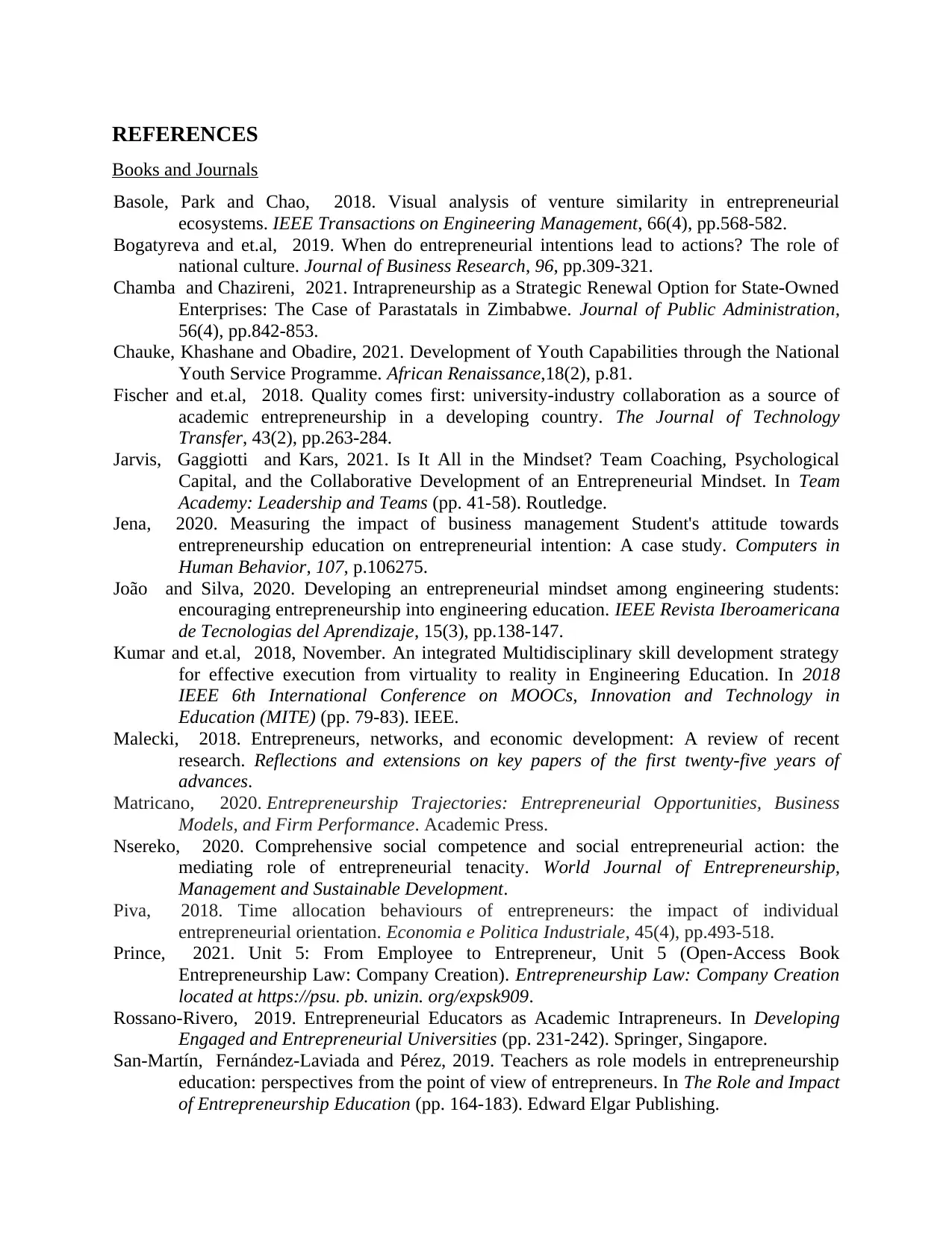
REFERENCES
Books and Journals
Basole, Park and Chao, 2018. Visual analysis of venture similarity in entrepreneurial
ecosystems. IEEE Transactions on Engineering Management, 66(4), pp.568-582.
Bogatyreva and et.al, 2019. When do entrepreneurial intentions lead to actions? The role of
national culture. Journal of Business Research, 96, pp.309-321.
Chamba and Chazireni, 2021. Intrapreneurship as a Strategic Renewal Option for State-Owned
Enterprises: The Case of Parastatals in Zimbabwe. Journal of Public Administration,
56(4), pp.842-853.
Chauke, Khashane and Obadire, 2021. Development of Youth Capabilities through the National
Youth Service Programme. African Renaissance,18(2), p.81.
Fischer and et.al, 2018. Quality comes first: university-industry collaboration as a source of
academic entrepreneurship in a developing country. The Journal of Technology
Transfer, 43(2), pp.263-284.
Jarvis, Gaggiotti and Kars, 2021. Is It All in the Mindset? Team Coaching, Psychological
Capital, and the Collaborative Development of an Entrepreneurial Mindset. In Team
Academy: Leadership and Teams (pp. 41-58). Routledge.
Jena, 2020. Measuring the impact of business management Student's attitude towards
entrepreneurship education on entrepreneurial intention: A case study. Computers in
Human Behavior, 107, p.106275.
João and Silva, 2020. Developing an entrepreneurial mindset among engineering students:
encouraging entrepreneurship into engineering education. IEEE Revista Iberoamericana
de Tecnologias del Aprendizaje, 15(3), pp.138-147.
Kumar and et.al, 2018, November. An integrated Multidisciplinary skill development strategy
for effective execution from virtuality to reality in Engineering Education. In 2018
IEEE 6th International Conference on MOOCs, Innovation and Technology in
Education (MITE) (pp. 79-83). IEEE.
Malecki, 2018. Entrepreneurs, networks, and economic development: A review of recent
research. Reflections and extensions on key papers of the first twenty-five years of
advances.
Matricano, 2020. Entrepreneurship Trajectories: Entrepreneurial Opportunities, Business
Models, and Firm Performance. Academic Press.
Nsereko, 2020. Comprehensive social competence and social entrepreneurial action: the
mediating role of entrepreneurial tenacity. World Journal of Entrepreneurship,
Management and Sustainable Development.
Piva, 2018. Time allocation behaviours of entrepreneurs: the impact of individual
entrepreneurial orientation. Economia e Politica Industriale, 45(4), pp.493-518.
Prince, 2021. Unit 5: From Employee to Entrepreneur, Unit 5 (Open-Access Book
Entrepreneurship Law: Company Creation). Entrepreneurship Law: Company Creation
located at https://psu. pb. unizin. org/expsk909.
Rossano-Rivero, 2019. Entrepreneurial Educators as Academic Intrapreneurs. In Developing
Engaged and Entrepreneurial Universities (pp. 231-242). Springer, Singapore.
San-Martín, Fernández-Laviada and Pérez, 2019. Teachers as role models in entrepreneurship
education: perspectives from the point of view of entrepreneurs. In The Role and Impact
of Entrepreneurship Education (pp. 164-183). Edward Elgar Publishing.
Books and Journals
Basole, Park and Chao, 2018. Visual analysis of venture similarity in entrepreneurial
ecosystems. IEEE Transactions on Engineering Management, 66(4), pp.568-582.
Bogatyreva and et.al, 2019. When do entrepreneurial intentions lead to actions? The role of
national culture. Journal of Business Research, 96, pp.309-321.
Chamba and Chazireni, 2021. Intrapreneurship as a Strategic Renewal Option for State-Owned
Enterprises: The Case of Parastatals in Zimbabwe. Journal of Public Administration,
56(4), pp.842-853.
Chauke, Khashane and Obadire, 2021. Development of Youth Capabilities through the National
Youth Service Programme. African Renaissance,18(2), p.81.
Fischer and et.al, 2018. Quality comes first: university-industry collaboration as a source of
academic entrepreneurship in a developing country. The Journal of Technology
Transfer, 43(2), pp.263-284.
Jarvis, Gaggiotti and Kars, 2021. Is It All in the Mindset? Team Coaching, Psychological
Capital, and the Collaborative Development of an Entrepreneurial Mindset. In Team
Academy: Leadership and Teams (pp. 41-58). Routledge.
Jena, 2020. Measuring the impact of business management Student's attitude towards
entrepreneurship education on entrepreneurial intention: A case study. Computers in
Human Behavior, 107, p.106275.
João and Silva, 2020. Developing an entrepreneurial mindset among engineering students:
encouraging entrepreneurship into engineering education. IEEE Revista Iberoamericana
de Tecnologias del Aprendizaje, 15(3), pp.138-147.
Kumar and et.al, 2018, November. An integrated Multidisciplinary skill development strategy
for effective execution from virtuality to reality in Engineering Education. In 2018
IEEE 6th International Conference on MOOCs, Innovation and Technology in
Education (MITE) (pp. 79-83). IEEE.
Malecki, 2018. Entrepreneurs, networks, and economic development: A review of recent
research. Reflections and extensions on key papers of the first twenty-five years of
advances.
Matricano, 2020. Entrepreneurship Trajectories: Entrepreneurial Opportunities, Business
Models, and Firm Performance. Academic Press.
Nsereko, 2020. Comprehensive social competence and social entrepreneurial action: the
mediating role of entrepreneurial tenacity. World Journal of Entrepreneurship,
Management and Sustainable Development.
Piva, 2018. Time allocation behaviours of entrepreneurs: the impact of individual
entrepreneurial orientation. Economia e Politica Industriale, 45(4), pp.493-518.
Prince, 2021. Unit 5: From Employee to Entrepreneur, Unit 5 (Open-Access Book
Entrepreneurship Law: Company Creation). Entrepreneurship Law: Company Creation
located at https://psu. pb. unizin. org/expsk909.
Rossano-Rivero, 2019. Entrepreneurial Educators as Academic Intrapreneurs. In Developing
Engaged and Entrepreneurial Universities (pp. 231-242). Springer, Singapore.
San-Martín, Fernández-Laviada and Pérez, 2019. Teachers as role models in entrepreneurship
education: perspectives from the point of view of entrepreneurs. In The Role and Impact
of Entrepreneurship Education (pp. 164-183). Edward Elgar Publishing.
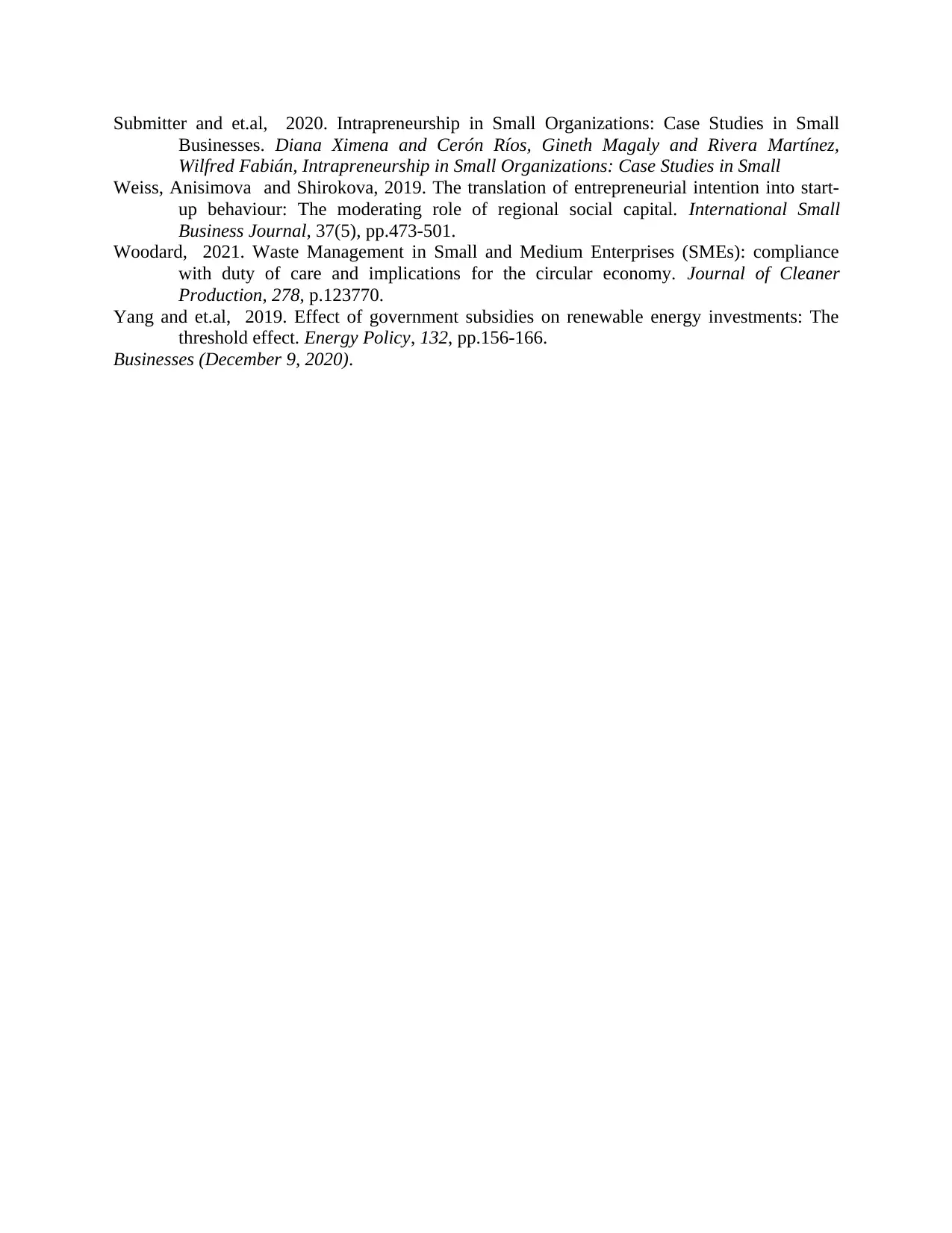
Submitter and et.al, 2020. Intrapreneurship in Small Organizations: Case Studies in Small
Businesses. Diana Ximena and Cerón Ríos, Gineth Magaly and Rivera Martínez,
Wilfred Fabián, Intrapreneurship in Small Organizations: Case Studies in Small
Weiss, Anisimova and Shirokova, 2019. The translation of entrepreneurial intention into start-
up behaviour: The moderating role of regional social capital. International Small
Business Journal, 37(5), pp.473-501.
Woodard, 2021. Waste Management in Small and Medium Enterprises (SMEs): compliance
with duty of care and implications for the circular economy. Journal of Cleaner
Production, 278, p.123770.
Yang and et.al, 2019. Effect of government subsidies on renewable energy investments: The
threshold effect. Energy Policy, 132, pp.156-166.
Businesses (December 9, 2020).
Businesses. Diana Ximena and Cerón Ríos, Gineth Magaly and Rivera Martínez,
Wilfred Fabián, Intrapreneurship in Small Organizations: Case Studies in Small
Weiss, Anisimova and Shirokova, 2019. The translation of entrepreneurial intention into start-
up behaviour: The moderating role of regional social capital. International Small
Business Journal, 37(5), pp.473-501.
Woodard, 2021. Waste Management in Small and Medium Enterprises (SMEs): compliance
with duty of care and implications for the circular economy. Journal of Cleaner
Production, 278, p.123770.
Yang and et.al, 2019. Effect of government subsidies on renewable energy investments: The
threshold effect. Energy Policy, 132, pp.156-166.
Businesses (December 9, 2020).
⊘ This is a preview!⊘
Do you want full access?
Subscribe today to unlock all pages.

Trusted by 1+ million students worldwide
1 out of 12
Related Documents
Your All-in-One AI-Powered Toolkit for Academic Success.
+13062052269
info@desklib.com
Available 24*7 on WhatsApp / Email
![[object Object]](/_next/static/media/star-bottom.7253800d.svg)
Unlock your academic potential
Copyright © 2020–2026 A2Z Services. All Rights Reserved. Developed and managed by ZUCOL.



